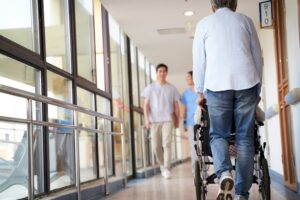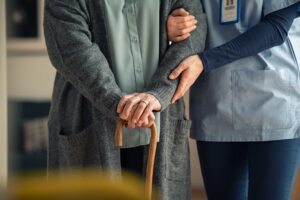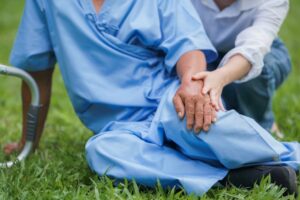Understaffing and Nursing Home Falls
Abuse and Neglect, Nursing Home AbuseUnderstaffing and nursing home falls are two complex issues that often go hand in hand. Unfortunately, understaffing in nursing homes is quite common and has serious consequences for the safety and well-being of residents. It can lead to inadequate supervision and care, increasing the risk of falls and other accidents.
Falls, in particular, are a significant concern in nursing homes as they can result in serious injuries, including fractures, head trauma, or sometimes even death. Nursing homes must prioritize proper staffing levels to ensure the safety of their residents. If you or your loved one has suffered a fall or injury due to understaffing in a nursing home, be sure to seek legal guidance from a nursing home abuse lawyer to hold the facility accountable for their negligence.
Signs of Understaffing in Nursing Homes

When it comes to nursing homes, the well-being and safety of residents should always be the top priority. However, many nursing homes struggle with understaffing due to various factors, including budget constraints and difficulty recruiting qualified staff. The consequences of such understaffing can be severe, leading to an increased risk of falls and other accidents among residents.
To protect your loved ones, be on the lookout for the signs of understaffing in nursing homes. By being aware of these signs, you can take appropriate action and ensure your loved ones receive the care they deserve.
High Resident-to-Staff Ratio
One clear indicator of understaffing in nursing homes is a high resident-to-staff ratio. Ideally, there should be enough staff members to effectively meet the needs of all residents, including assistance with daily activities, supervision, and timely response to emergencies. However, when the ratio of residents to staff is unreasonably high, it becomes challenging for staff members to provide adequate care and attention to each resident. This can result in delays in response times, neglect, and increased risks of falls and accidents.
Staff Burnout and Turnover
Understaffing often leads to staff burnout and high turnover rates. When caregivers are overworked and stretched thin, it can take a toll on their physical and mental well-being. Constantly facing long hours, heavy workloads, and high stress levels, nursing home staff members may become exhausted and lose their motivation to provide quality care. This can negatively impact their ability to prevent falls and accidents among residents. Additionally, high turnover rates mean new and inexperienced staff members may be tasked with caring for residents, further increasing the risk of incidents due to inadequate training.
Delayed Response to Call Lights and Emergencies
One of the most alarming signs of understaffing in nursing homes is a delayed response to call lights and emergencies. In a properly staffed facility, residents should receive prompt assistance, especially in emergencies or when they require immediate medical attention. However, understaffed nursing homes often struggle with meeting these response times due to the limited number of available staff members.
Unattended Residents
Understaffing may result in residents being left unattended for extended periods. When there are not enough staff members to monitor and assist residents, they may be left alone for prolonged periods of time. This can be particularly dangerous for individuals who require frequent assistance with mobility, personal hygiene, or medication management. Unattended residents may attempt to accomplish tasks on their own, leading to falls and other accidents that could have been prevented with proper supervision and assistance.
Lack of Individualized Care
Providing individualized care is imperative in nursing homes, as each resident has unique needs and requirements. Understaffing can hinder the ability to deliver personalized care, as staff members may not have enough time to assess and address the specific needs of each resident adequately. This can result in neglect and an increased risk of falls caused by inadequate support, monitoring, and intervention. Residents may not receive the necessary attention to maintain their overall health and prevent accidents, putting their well-being in jeopardy.
Poorly Maintained Facilities
Understaffing can also manifest in the maintenance and cleanliness of nursing home facilities. When there aren’t enough staff members to handle the day-to-day tasks of cleaning, maintaining, and repairing the premises, the overall condition of the facility may decline. This can create hazards such as loose flooring, faulty handrails, or poorly lit areas that increase the risk of falls and injuries. Be sure to pay attention to the physical state of a nursing home as it can indicate the level of staffing and the potential risks residents may face.
Causes of Understaffing in Nursing Homes

Nursing homes are vital in providing care and support for elderly individuals who can no longer live independently. These facilities are responsible for ensuring the safety and well-being of their residents. However, when nursing homes are understaffed, it can have detrimental effects on the residents, increasing the risk of falls.
Understaffing in nursing homes can be attributed to various factors. Some of the most common causes include:
- Budget constraints: Nursing homes may prioritize cost-cutting measures, reducing the number of staff members to save money.
- Staff turnover: High turnover rates can result in understaffed facilities as it takes time to hire and train new employees.
- Lack of qualified staff: A shortage of skilled nurses and caregivers may make it challenging to maintain adequate staffing levels.
Consequences of Nursing Home Falls
When nursing home residents experience falls, the consequences can be severe. Some potential consequences include:
- Physical injuries: Falls can result in fractures, head injuries including traumatic brain injuries (TBI), bruises, and lacerations. These injuries may require medical treatment and can have long-term effects on the resident’s health.
- Emotional impact: Falls can also significantly impact residents emotionally. They may experience fear, anxiety, and a loss of confidence, which can affect their overall well-being.
- Increased healthcare costs: Falls often require medical attention and may lead to hospitalization. The associated healthcare costs can place a financial burden on the resident and their family.
The Impact of Understaffing in Nursing Homes
Proper staffing is necessary to ensure the safety and well-being of all nursing home residents. However, many facilities across the country are facing challenges in maintaining adequate staffing levels. Understaffing in nursing homes can have severe consequences, especially when it comes to preventing falls.
Inadequate Supervision and Care
When nursing homes are understaffed, there simply aren’t enough staff members to adequately supervise and care for the residents. This lack of supervision can lead to neglect and the failure to provide timely assistance to residents, increasing the risk of falls.
Delayed Response Time
Understaffing also results in delayed response times to residents’ needs. In the case of a fall, every second counts. Suppose there aren’t enough staff members available to respond quickly. In that case, the resident may be left lying on the floor for an extended period, increasing the risk of further injury or complications.
In addition, when nursing home residents need to use the restroom, they often need to get up and go immediately. If there aren’t enough staff around, they have to wait for help. Some of them can’t wait, get tired, or get frustrated waiting. Then, they attempt to get up by themselves and fall in the process.
Lack of Preventative Measures
Proper staffing is essential for implementing preventative measures to reduce the risk of falls. This includes regular monitoring of residents, conducting fall assessments, and implementing safety measures such as grab bars and non-slip flooring. When nursing homes are understaffed, these preventative measures may be neglected or not enforced consistently, putting residents at a higher risk of falling.
Understanding the Risk of Falls in Nursing Homes

Falls are a serious concern for nursing home residents, especially older adults who may have existing health conditions or mobility issues. The consequences of falls can be devastating and may lead to long-term injuries or even death. It is important to be aware of the factors contributing to falls in nursing homes to understand the gravity of the issue.
Age-Related Factors
As people age, their physical abilities and balance may decline, making them more susceptible to falls. Nursing home residents are often among the elderly, and many may already have preexisting conditions that affect their mobility and stability, increasing the risk of falls.
Environmental Hazards
Nursing home environments can pose various hazards that increase the risk of falls. These hazards include slippery floors, inadequate lighting, obstacles in hallways, and improperly maintained equipment. When nursing homes are understaffed, these hazards may go unnoticed or unaddressed, increasing the risk of falls for residents.
Medication Side Effects
Many nursing home residents take multiple medications, which can have side effects such as dizziness, drowsiness, or lightheadedness. These side effects can increase the risk of falls, especially if the resident is not properly monitored or there is a lack of communication between healthcare providers.
Lack of Mobility Assistance
Residents may require assistance with mobility, such as getting in and out of bed, using the bathroom, or moving around the facility. However, when nursing homes are understaffed, residents may not receive the necessary assistance, increasing the likelihood of falls during these activities.
Seeking Legal Guidance for Nursing Home Falls Due to Understaffing
If you or your loved one has suffered a fall or injury due to understaffing in a nursing home, it’s in your best interest to seek legal guidance to protect your rights and hold the facility accountable for their negligence. Nursing home falls can result in significant medical expenses, long-term care needs, pain and suffering, and a diminished quality of life. A qualified nursing home attorney can navigate the legal process and ensure you receive the compensation you deserve.
Why You Need a Nursing Home Attorney

If you or a loved one has been affected by an understaffing issue that resulted in a fall in a nursing home, it is crucial to seek legal guidance. A nursing home accident lawyer can help navigate the complexities of the legal system and ensure your rights are protected. Here are some reasons to consider consulting an attorney:
Experience
A nursing home accident lawyer has extensive experience in handling cases involving nursing home falls and understaffing. They understand the federal and local laws and regulations that apply to nursing homes and can navigate the legal system to maximize your chances of a successful outcome.
Determining Liability
Understaffing in nursing homes can be a form of negligence on the part of the facility. An experienced nursing home accident attorney can investigate your case, gather evidence, and determine who may be held liable for the fall. They will analyze factors such as the nursing home’s duty of care, staffing policies, and any violations of regulations.
Assessing Damages
A nursing home fall can result in significant physical, emotional, and financial damages. A skilled nursing home accident lawyer can help assess the full extent of your damages, including medical expenses, pain and suffering, lost income, and future care needs. They will work to ensure you receive fair compensation for your losses.
Negotiating with Insurance Companies
Insurance companies representing nursing homes may try to offer a low settlement or deny liability altogether. Having a skilled attorney on your side can level the playing field. They will negotiate with the insurance companies on your behalf, seeking maximum compensation for your injuries and losses.
Suing for Negligence
If a fair settlement cannot be reached, your nursing home lawyer can file a lawsuit against the nursing home for negligence. They will guide you through the legal process, representing your best interests and presenting a compelling case in court.
Contact a Skilled Nursing Home Attorney Today
Understaffing in nursing homes presents a significant challenge in providing adequate care for residents. When nursing homes are understaffed, it can lead to an increased risk of falls among residents, which can result in severe injuries or even death.
This complex issue requires a thorough investigation to determine whether the nursing home failed to provide sufficient staff to meet the needs of the residents. If you or someone you know has been affected by an understaffing issue leading to a fall in a nursing home, it is important to seek legal guidance. Contact a skilled personal injury attorney today to discuss your case and explore your legal options.
Nathan Hughey, an attorney and fourth-generation South Carolinian, founded Hughey Law Firm in 2007. Before that, he spent five years defending nursing homes and insurance companies. Leveraging his experience, he now advocates for those injured or wronged by such entities, securing over $220 million in verdicts and settlements.
